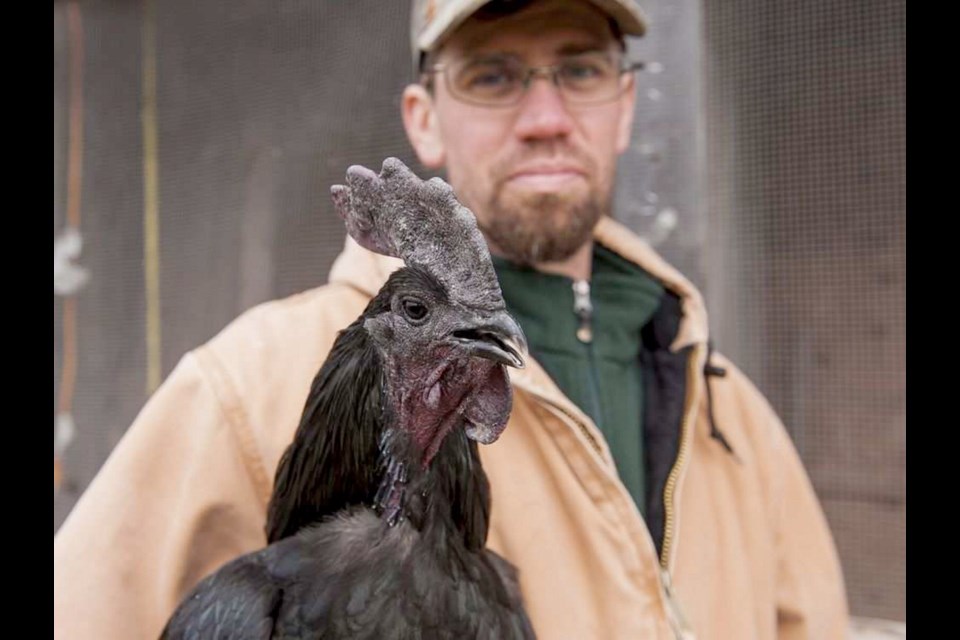A chorus of squawks and a shower of feathers greet Matthew Nelson as he unlatches the coop door and dives inside.
The chickens don’t stop shrieking the fowl-ish equivalent of “Intruder!” until he is out again, a black chicken hugged closely to his chest.
Meet the Bla Hona — sort of.
The hen Nelson recently showed off at his Delta farm has a black beak, black wattle and black feathers with blue undertones, but it doesn’t quite have all the characteristics of the rare Swedish Blue Hen, or Bla Hona.
Nelson hopes that with more selective breeding — allowing the hens and roosters with the bluest feathers to mate — his Grade Eh Farms, which specializes in rare and heritage chickens, will have a perfect flock of Bla Hona by spring.
A trio of the birds — one rooster and two hens — could sell for $5,000.
“It’s a challenging process to import the breeds and select for the right characteristics,” he said. “But that’s also what I enjoy about it.”
Thousand-dollar chickens, designer chicken coops and clothing — there’s nothing boring about chickens these days. As more B.C. municipalities allow backyard poultry, and more people seek to reconnect with their food sources, chickens are becoming “feather babies” in addition to farm animals.
An emotional support duck recently made headlines in the United States when he took his first flight on an airplane, while Stanley Park’s stray rooster was the subject of media attention when someone made him a pair of birdy booties for his bumblefoot (a condition similar to arthritis).
Nelson said his business has quadrupled since he started selling heritage chickens online three years ago. He attributes his success to a growing number of backyard chicken farmers, some of whom seek beautiful and unique birds as a hobby, and others who like the slight variations in the eggs and meat of different breeds.
Vancouver reports 249 total registrations to date for backyard poultry, six years after city councillors first gave backyard hens the green light. In 2010, there was only 13 registrations. (The city does not require people to unregister when they stop keeping chickens, so the number of actual owners could be less, said a spokesman.)
Surrey and West Vancouver recently joined Vancouver, the City of North Vancouver, New Westminster, Squamish and Victoria in allowing backyard birds.
“People are very committed to their poultry,” said Nelson, displaying a cellphone picture of a happy client cuddling with a chicken. “They really become part of the family.”
The wonderful — and sometimes weird — world of chickens is on full display on Cat Wood’s Facebook group, B.C. Backyard Poultry Growers.
With almost 3,000 members, people share advice on everything from chicken feed and health to killing methods.
Someone searches for a broiler breed with “large breasts.” Someone else posts a video of a chicken making an odd sound — “Is she sick?” There are offers of birds for free, for sale, and an offer to knit chicken sweaters for birds in need. (The chicken sweater is a topic of hot debate, with some members saying they’re useless or dangerous, and others saying they keep birds warm when they lose their feathers during moulting.)
Wood said she has three to five new requests from people seeking to join the group each day.
“There’s some armchair expertise, and there’s people who really know their stuff,” she said.
But Wood isn’t certain about using the term “pet” for a chicken. While they can be companions, she said, they are certainly livestock.
The blurring of that line led the U.S. Centre for Disease Control and Prevention to tell people to stop kissing their chickens in a report published this month, calling salmonella outbreaks linked to household chickens an “emerging public health trend.”
In May 2015, the B.C. Centre for Disease Control put out a similar warning against kissing chicks after there was a salmonella outbreak among people who had contact with live poultry from an Alberta hatchery.
The B.C. SPCA encourages people to buy eggs from SPCA-certified farmers, saying “raising hens in an urban, backyard environment is not a suitable practice for individuals with little to no knowledge or experience in chicken care.”
University of Minnesota animal interaction specialist and PhD candidate Tanya Bailey has been working with “therapy chickens” for more than 15 years, using them to promote health and help people with post-traumatic stress disorder. The therapist said caring for chickens can be a “grounding ritual” for families in an increasingly haphazard world.
“Chickens bring a sense of the cycle of life,” she told Postmedia News. “We call our daily time with our chickens our ‘Chicken TV.'”
At Grade Eh Farms, the cacophony in the coop increases as Nelson opens the door to return the beautiful Bla Hona to her mates. About 150 chickens representing 15 different breeds run and hop and peck at the ground in a field surrounded by sunflowers.
“They have distinct personalities,” he said. ” It’s entertaining to watch sometimes.”



